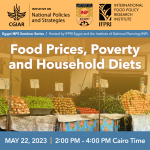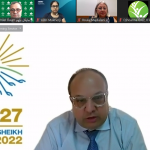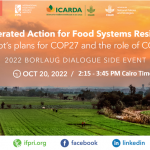Over the last few decades, the world has experienced recurring food crises characterized by rampant inflation and spikes in food, fertilizer and fuel prices. Most of these major spikes in food prices are triggered by major events, including the COVID-19 pandemic and the Russia-Ukraine war. More recently, the Russia-Ukraine crisis and associated trade shocks have caused significant disruptions in global markets and hence immediate surges in global food, fuel, and fertilizer prices.
CGIAR Borlaug Dialogue 2022 side event: Egypt’s COP27 plans and the role of CGIAR
On Thursday, October 20, 2022, The International Food Policy Research Institute (IFPRI), The International Center for Agriculture Research in the Dry Areas (ICARDA), and CGIAR’s Initiative: National Policies and Strategies (NPS) jointly organized a Pre-COP27 seminar: Accelerated Action for Food Systems Resilience: Egypt’s Plans for Cop27 and The Role Of CGIAR. The virtual seminar was also live-streamed as Borlaug Dialogue side event. This event was inspired by Egypt's Presidency of COP27 and hence the main objective of the event was to highlight Egypt’s priorities for COP27. The event also covered discussions specific to Egypt’s agri-food sector as well as CGIAR’s research portfolio and plans for COP27. The event brought together representatives from Egypt's Presidency of COP27 and several senior leaders and climate scientists from CGIAR.
Egypt NPS Seminar: Accelerated Action for Food Systems Resilience: Egypt’s plans for COP27 and the role of CGIAR
Unprecedented extreme weather events linked to climate change are contributing to the current global food and energy price crisis and severely impacting livelihoods and food and nutrition security. In this context, expectations are high for the 27th Conference of the Parties of the U.N. Framework Convention on Climate Change (COP27) taking place under the Presidency of the Arab Republic of Egypt.
EGYPT NPS SEMINAR SERIES: Global Food Crises and One CGIAR’s Response
Recurrent food crises and shocks in the world necessitate immediate national as well as global responses to provide short-term relief and longer-term policy change. As economies began recovering from the global COVID-19 pandemic during 2021, the Russian-Ukraine crisis emerged and has become a major setback to global recovering, sparking another global food security crisis




